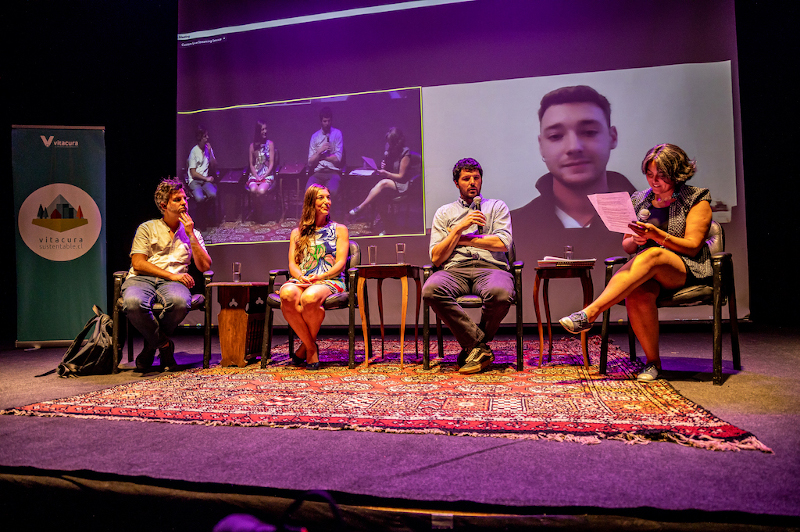Chile addresses in a meeting the challenges and the role played by the media in tackling the climate crisis affecting the planet.
Santiago de Chile, 14 December 2022 - On Tuesday 13 December, the seminar The role of Communications in Climate Change, organised by the Ministry of the Environment (MMA) of Chile with the support of the EUROCLIMA+ programme through the International and Ibero-America Foundation for Administration and Public Policy (FIIAPP), took place.
The objective of the event was to reflect on the contribution that the media, both traditional and alternative, should make to raise awareness in the population about the impacts, effects and consequences of climate change, especially in Chile.
“The climate crisis is the greatest challenge we face as humanity. We have a short window of opportunity to act energetically, because the option to secure a liveable future is closing fast. That is why communication and the role it plays in raising public awareness is key. To discuss this contribution, I invite you to participate in this seminar, especially students, academics and professionals in the field of social communication.”
Maisa Rojas, Minister of the Environment.
The activity was attended by María Elena Oliveros, FIIAPP project technician in the Euroclima+ programme; Andrea Obaid, president of the Chilean Association of Journalists and Professionals for Science Communication (AChiPeC); Martín del Río, Founder and CEO of Ladera Sur; Sebastián Benfeld, PUCV journalism student and founder of the "Escazú Now" movement; and Diego Riveaux, Director of the Sustainability and Innovation Directorate of the Municipality of Vitacura.
In her intervention, María Elena Oliveros pointed out that "a fundamental element for all the actions that are being developed is to know how to communicate new narratives that allow us to provide solutions towards climate resilience in a consensual manner with civil society. This seminar is part of a broad training process that the Chilean MMA has and that is part of the Climate Change policy in Chile. What is being done today is also a reference and a source of learning for Spain and Europe".
Johana Arriagada, from the Climate Change Division of the Chilean Ministry of Environment, explained that "we brought together panelists from the scientific world, alternative media, civil society and the public sector to obtain different points of view on how to communicate the impacts of Climate Change and how we move towards climate action, as part of the ACE Strategy that has as its axes to promote environmental education, citizen participation, access to information, public awareness to generate cooperation between different actors and move towards climate action in the country".
Finally, Andrea Obaid indicated that "it is very important the role that we communicators and disseminators have to deliver this information to society in this climate and water crisis that we are experiencing. The idea is for us to be a bridge between the scientific community and society so that citizens can take ownership of this knowledge and make the right decisions”.
This activity is part of the piloting actions for the preparation of the Strategy for Capacity Building and Climate Empowerment, which is being supported by the EUROCLIMA+ programme through the FIIAPP.
What is Action for Climate Empowerment?
Action for Climate Empowerment (ACE) was a term coined in the context of the United Nations Framework Convention on Climate Change (UNFCCC) to refer to the actions taken by countries under Article 6 of the same convention that integrates 6 elements: education, training, public awareness, access to information, participation and cooperation. In addition, it promotes processes that foster a citizenry that is aware of and empowered around climate change in order to take responsibility - to the extent that it is their responsibility - for the important transformations that must be carried out in order to change the pattern of greenhouse gas emissions and adapt lifestyles, consumption and production, in accordance with the impacts of climate change.
More information on capacity building and climate empowerment here.
About EUROCLIMA+
EUROCLIMA+ is a programme funded by the European Union and co-financed by the German federal government through the Federal Ministry for Economic Cooperation and Development (BMZ), as well as by the governments of France and Spain through the Ministry of Foreign Affairs, European Union and Cooperation.
The Programme's mission is to reduce the impact of climate change and its effects in 33 countries in Latin America and the Caribbean, promoting mitigation, adaptation, resilience and climate investment. It is implemented according to the "Spirit of Team Europe" under the synergistic work of seven agencies: the Spanish Agency for International Development Cooperation (AECID), the French Development Agency (AFD); the Economic Commission for Latin America and the Caribbean (ECLAC); Expertise France (EF); the International and Ibero-American Foundation for Public Administration and Policy (FIIAPP); the German Society for International Cooperation (GIZ) GmbH, and the UN Environment Programme (UNEP).

